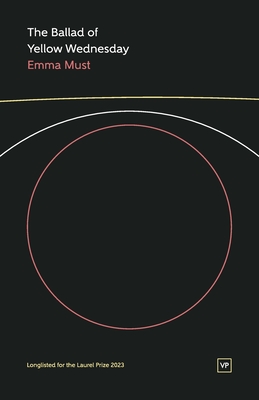The Ballad of Yellow Wednesday

The Ballad of Yellow Wednesday
In 1992, a group of young people began to protest against the extension of the M3 motorway through Twyford Down - a new road that would carve through the chalk hills of one of England's 'protected' Areas of Outstanding Natural Beauty. The Ballad of Yellow Wednesday, published thirty years later, contains powerful, moving and honest depictions of the campaign, exploring the ways in which language reaches us, saves us, or fails to convince us. Here, protest actions are juxtaposed with judicial statements, teetering between the active and passive voice, the human and non-human.
Longlisted for the 2023 Laurel Prize and Highly Commended in the 2023 Forward Prizes
In 1992, a group of young people began to protest against the extension of the M3 motorway through Twyford Down outside Winchester - a new road that would, by the hands of the Conservative government, cut seven minutes off the journey time between London and Southampton, whilst carving through the chalk hill in one of England's 'protected' Areas of Outstanding Natural Beauty. The Dongas Tribe, as they would later be known, named after the Matabele word for 'gully', radically altered the UK environmental movement, lauded by the Guardian as having 'kickstarted a major shift in green attitudes in both government and the public.' Twyford Down became a symbol for a further 1,000 protected heritage sites across the UK which were planned to undergo the same process, removing idiosyncrasy from the landscape and presenting an ideal for a country based on mobility and so-called 'progress'.
Emma Must was awarded the Goldman Environmental Prize for her efforts towards land protection, including a period of detention in Holloway Prison as one of the 'Twyford Seven'. Must's searing collection, published 30 years after the Twyford protests, considers the role that language plays as witness to our actions on Earth. These powerful, moving and honest depictions of the Twyford protests explore the ways in which language reaches us, saves us, and fails to convince us. Here, the land reveals its histories to the reader, whilst protest actions entwine themselves around judicial statements, teetering between the active and passive voice, the human and non-human.
* * *
Royalties from each sale of this book will be donated to Transport Action Network and the A36/A350 Corridor Alliance.
PRP: 79.13 Lei
Acesta este Prețul Recomandat de Producător. Prețul de vânzare al produsului este afișat mai jos.
71.22Lei
71.22Lei
79.13 LeiIndisponibil
Descrierea produsului
In 1992, a group of young people began to protest against the extension of the M3 motorway through Twyford Down - a new road that would carve through the chalk hills of one of England's 'protected' Areas of Outstanding Natural Beauty. The Ballad of Yellow Wednesday, published thirty years later, contains powerful, moving and honest depictions of the campaign, exploring the ways in which language reaches us, saves us, or fails to convince us. Here, protest actions are juxtaposed with judicial statements, teetering between the active and passive voice, the human and non-human.
Longlisted for the 2023 Laurel Prize and Highly Commended in the 2023 Forward Prizes
In 1992, a group of young people began to protest against the extension of the M3 motorway through Twyford Down outside Winchester - a new road that would, by the hands of the Conservative government, cut seven minutes off the journey time between London and Southampton, whilst carving through the chalk hill in one of England's 'protected' Areas of Outstanding Natural Beauty. The Dongas Tribe, as they would later be known, named after the Matabele word for 'gully', radically altered the UK environmental movement, lauded by the Guardian as having 'kickstarted a major shift in green attitudes in both government and the public.' Twyford Down became a symbol for a further 1,000 protected heritage sites across the UK which were planned to undergo the same process, removing idiosyncrasy from the landscape and presenting an ideal for a country based on mobility and so-called 'progress'.
Emma Must was awarded the Goldman Environmental Prize for her efforts towards land protection, including a period of detention in Holloway Prison as one of the 'Twyford Seven'. Must's searing collection, published 30 years after the Twyford protests, considers the role that language plays as witness to our actions on Earth. These powerful, moving and honest depictions of the Twyford protests explore the ways in which language reaches us, saves us, and fails to convince us. Here, the land reveals its histories to the reader, whilst protest actions entwine themselves around judicial statements, teetering between the active and passive voice, the human and non-human.
* * *
Royalties from each sale of this book will be donated to Transport Action Network and the A36/A350 Corridor Alliance.
Detaliile produsului










